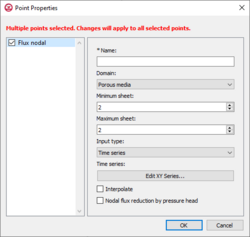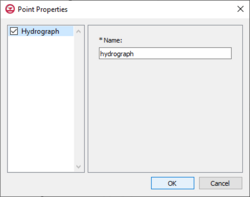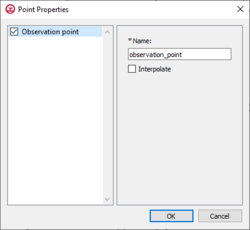User:Mburton/HydroGeoSphere Point Properties Dialog: Difference between revisions
From XMS Wiki
Jump to navigationJump to search
No edit summary |
No edit summary |
||
| Line 1: | Line 1: | ||
The Point Properties dialog in the HydroGeoSphere model is where the input parameters for nodes associated with the relative coverage are set. The Boundary Conditions, Observations, and Hydrograph coverages each have their own individual parameters under the Point Properties dialog, depending on which coverage is active. | The Point Properties dialog in the HydroGeoSphere model is where the input parameters for nodes associated with the relative coverage are set. The Boundary Conditions, Observations, and Hydrograph coverages each have their own individual parameters under the Point Properties dialog, depending on which coverage is active. | ||
[[File:HGS point prop.png|thumb| | [[File:HGS point prop.png|thumb|250 px|'''Point Properties''' dialog for the Boundary Conditions coverage]] | ||
==Flux nodal Parameters, Boundary Conditions Coverage== | ==Flux nodal Parameters, Boundary Conditions Coverage== | ||
| Line 17: | Line 17: | ||
***Interpolate: causes time-varying values to be interpolated, resulting in a smoother application of the time-varying function. | ***Interpolate: causes time-varying values to be interpolated, resulting in a smoother application of the time-varying function. | ||
***Nodal flux reduction by pressure head: reduces flux as a function of the nodal pressure head to avoid pumping from the dry materials. | ***Nodal flux reduction by pressure head: reduces flux as a function of the nodal pressure head to avoid pumping from the dry materials. | ||
[[File:HGS point prop hydrograph.png|thumb|250px|'''Point Properties''' dialog for the Hydrograph coverage]] | |||
==Hydrograph Parameters, Hydrograph Coverage== | ==Hydrograph Parameters, Hydrograph Coverage== | ||
The only input available in the Point Properties dialog on a Hydrograph coverage is a name. The name should be something descriptive, and less than 80 characters. | The only input available in the Point Properties dialog on a Hydrograph coverage is a name. The name should be something descriptive, and less than 80 characters. | ||
[[File:HGS point prop obs.png|thumb|250px|'''Point Properties''' dialog for the Observation coverage]] | |||
==Observation Parameters, Observation Coverage== | ==Observation Parameters, Observation Coverage== | ||
Revision as of 19:08, 4 August 2023
The Point Properties dialog in the HydroGeoSphere model is where the input parameters for nodes associated with the relative coverage are set. The Boundary Conditions, Observations, and Hydrograph coverages each have their own individual parameters under the Point Properties dialog, depending on which coverage is active.
Flux nodal Parameters, Boundary Conditions Coverage
- Name: the name of the boundary condition. Names should be unique and contain no white space.
- Domain: the domain in which the boundary conditions are applied.
- Porous media
- Minimum sheet: the minimum node sheet; boundary conditions are applied between the minimum and maximum node sheets.
- Maximum sheet: the maximum node sheet; boundary conditions are applied between the minimum and maximum node sheets.
- Input type: how the boundary condition data is specified.
- Time series: time-varying values of the boundary condition. A table is generated using the XY Series Editor dialog that is opened by clicking the Edit XY Series button by either manually entering the data, or importing the data.
- Surface flow
- Input type: how the boundary condition data is specified.
- Constant: constant value of the boundary condition.
- Time series: time-varying values of the boundary condition. A table is generated using the XY Series Editor dialog that is opened by clicking the Edit XY Series button by either manually entering the data, or importing the data.
- Time raster table: the Edit Table... opens the Time raster table dialog where the data is entered by selecting a raster from outside GMS.
- Interpolate: causes time-varying values to be interpolated, resulting in a smoother application of the time-varying function.
- Nodal flux reduction by pressure head: reduces flux as a function of the nodal pressure head to avoid pumping from the dry materials.
- Input type: how the boundary condition data is specified.
- Porous media
Hydrograph Parameters, Hydrograph Coverage
The only input available in the Point Properties dialog on a Hydrograph coverage is a name. The name should be something descriptive, and less than 80 characters.
Observation Parameters, Observation Coverage
- Name: this should be a descriptive name for the observation point, and less than 40 characters.
- Interpolate: output values are linearly interpolated from the nodal values at the vertices at the element that contains the observation point.


